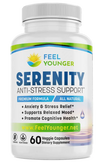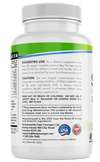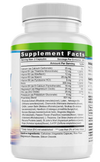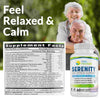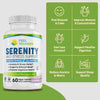Serenity Anti-Stress Support
- Product Description
- Supplement Facts
Would you like to…
- Feel more Relaxed and at Ease
- Feel less Stress
- Have more Resilience to deal with Stressful Situations Calmly
- Reduce Anxiety and Worry Less
- Feel more Calm and Less Overwhelmed
- Improve Your Memory and Concentration
- Optimize your Levels of Serotonin, GABA and Cortisol
- Sleep Better at Night, Worry Free
If so, you may want to give our Serenity Anti-Stress Support supplement a try!
The ingredients in this product can potentially give you a whole host of other benefits, such as:
- Antioxidant support
- Anti-inflammatory support
- Improved bone health
- Improved immunity
- Improved brain function and cognition
- Improved cardiovascular health
- Improved skin health
- Improved digestive health
- Blood pressure support
What causes stress, and why is it important to lower your stress levels?
Have you ever met someone who doesn’t experience much stress? It’s pretty rare. While certain types of stress are good (eustress), usually intense and brief stresses like exercise, a cold shower or getting outside your comfort zone every now and then, long term, chronic stress (distress) has been proven to be a significant factor in creating a large variety of health problems.
There are different categories of Stress:
- Mental Stress, like anxious thoughts and worrying about the past or future
- Chemical Stresses, like toxins and infections
- Emotional Stresses, like Anger and Sadness, or traumas
- And Physical Stresses, like Hunger, Cold, Exhaustion etc
All of these are, to some degree, ‘normal’, and yet any of these stresses, once excessive, can cause significant and debilitating levels of suffering (distress), which can lead to health issues sooner or later.
Any of the above stimuli can lead to being in a state of stress, which is where your fight or flight response activates your adrenal glands to release a cocktail of Neurochemicals into your body to help cope with the situation. Adrenaline, Noradrenaline and Cortisol are the 3 main Neurochemicals that are released.
Adrenaline and Noradrenaline increase your heart rate, bring more blood flow into the muscles and lungs, give you a surge of energy and raise your blood pressure.
Cortisol increases glucose levels in your blood, activates your brain to use more glucose and makes the substances that repair tissues more readily available in your body.
All of this response is Good and Healthy, IF it is temporary (a few hours at most) and occasional (not every day).
When you’re stressed, you can feel:
- Angry, irritable or uptight
- Overwhelmed
- Unable to focus
- Anxious and Worried
- Afraid
If the Stress is Extreme enough, or Chronic enough, or both, you can go into another mode called the Dorsal Vagal Mode. In this state, the body has decided it is not worth fighting anymore, and the best strategy is to conserve energy and ‘play dead.’
In this case, heart rate and blood pressure can go down, respiration decreases, energy production and metabolism decreases, and the person experiences very little energy or motivation, due to downregulation of Dopamine.
This is often described as being depressed [1].
In either case, whether you stay Chronically in a high stress state, or a Depressed state, or vacillation between the two, Prolonged exposure to these stress states can lead to many health problems, such as:
- High or Low Blood Pressure
- Heart problems
- Obesity
- Blood Sugar Dysregulation
- Skin Conditions
- Digestive Problems
- Allergies and Intolerances
- Exhaustion
- Trouble sleeping
- Headaches and dizziness
- Uncontrollable muscle tension, such as the clenching of your jaw
- Aches and pains
- Weakened immune system, often leading to repeated and/or chronic infections
- Difficulties having desire for sex (women) or inability to have sex (men).
- Panic attacks
Can You Test For Stress?
The best test for Stress is a 24 hour Saliva Cortisol Test, preferably with DHEA included.
This gives you a snapshot of how much stress you are experiencing throughout the day, and can also give some clues as to whether the stress has been long term, and how depleted you are from it, if at all.
The Top 8 Ways to Lower Your Stress Levels:
Although there are situations that are out of your control that cause stress, the one thing you can learn to have control over is your emotional response to those situations.
In other words, Stress is not something that happens to you, it’s your response to what happens to you. However, the stress response is largely automatic, so the only way to change how much situations ’stress you out’ is to retrain your nervous system to respond to situations in a more optimal way.
Until recently, mainstream science believed that our ability to change our stress response was limited, but Wim Hof helped prove that we can control our response to even the most extreme stresses, proving his point by breaking dozens of world records and helping seemingly anyone who trained under him to completely change their stress response, e.g. by showing them how to climb to the top of Mount Everest unassisted wearing very little clothing!
On a more practical, everyday level, there’s a variety of lifestyle changes you can make to help lower your stress levels, such as:
- Meditating. Studies have shown the positive impacts of meditation on stress levels [2]. This is traditionally used for lowering mental stress particularly, and is also great for lowering emotional stress.
- Eat a healthy organic diet. The negative effects of stress on your body can be lessened by eating a healthier, organic diet [3]. This reduces your Chemical Stress load.
- Do breathing exercises [4] which can lower your heart rate, blood pressure and reduce anxiety. There are many out there to try. This is traditionally used for lowering emotional stress particularly.
- Exercise regularly. Physical activity is a great way to have temporary physical stress which then actually lowers your overall stress and clears your mind [5].
- Talk to someone about your problems. Simply “getting it off your chest” is a great way to reduce the pressure and stress you feel. Great for mental and emotional stress.
- Stay social. All humans are, to some degree, social beings, and social isolation has been proven to increase stress levels [6]. Make sure you interact with people who do not consistently increase your emotional and mental stress!
- Take some time off work. Whether that be a holiday, or giving yourself 2 days off a week - time off work where you can think about nothing and totally relax is essential to lower your stress.
- Support your body with nutrients and minerals that will help you to be more relaxed, and lower your stress levels:
Calcium. Extreme fatigue can be caused by calcium deficiency, which can lead to insomnia [7]. Insomnia can lead to feeling worried, which in turn makes the insomnia worse!
When we are sleep deprived, we are more susceptible to stress [8].
B-Complex Vitamins. B vitamins, such as thiamine, riboflavin, niacin, pyridoxine, biotin, d-calcium and pantothenate play crucial roles in mood regulation [9].
Plus, the more stress we experience, the more B Vitamins we use. And then when we get low in B Vitamins we are less resilient to stress. Another vicious circle! Break the cycle with extra B Vitamins.
Magnesium. Research suggests that being deficient in magnesium can increase your susceptibility to stress and anxiety [10], which causes further magnesium loss, and more stress [11].
Zinc. Over time, zinc supplementation [12] can help to stabilize cortisol levels and raise your mood [13].
Potassium. Studies have shown that potassium plays an important role in helping to regulate blood pressure [14].
GABA. GABA (gamma aminobutyric acid) is an amino acid that naturally occurs in the body. It works as a neurotransmitter in the brain by attaching to GABA receptors (a protein in the brain) to produce a calming effect.
As such, it can help reduce anxiety, stress and fear and also help with sleep [15].
Lemon Balm. Lemon balm can help to reduce anxiety and symptoms of stress which helps you to relax more easily [16].
A study showed that laboratory-induced psychological stress was eased when taking lemon balm and those who took the lemon balm self reported increased calmness and alertness [17].
Passionflower. Passionflower (P. incarnata) is a herb that is thought to help lessen symptoms of insomnia [18] and reduce anxiety [19].
It potentially does this by boosting the levels of GABA in your brain.
Oat Straw. Oat straw has been used traditionally as a natural remedy to help relieve anxiety, depression and stress [20].
It is thought to do this by inhibiting PDE4 (enzyme phosphodiesterase type 4), which in doing so could help relieve stress and anxiety [21].
Introducing Feel Younger® Serenity Anti-Stress Support
We understand that it’s not always easy, nor practical to implement a variety of lifestyle changes - especially all at once.
We’d advise that you make as many of those changes as possible, but do so 1 or 2 at a time, make sure they stick and then move onto more.
In the meantime, you can support your body with the essential nutrients and minerals it needs that can help lower your stress levels.
That’s why in addition to the ingredients listed above, we’ve added the following ingredients to our Serenity Anti-Stress Support formula:
- Rhodiola Extract - can help to reduce anxieties and combat depress [22]
- Lutein - in mice, potentially helped to combat depression by protecting nerves in the hippocampus (a part of the brain responsible for emotions and memory) [23]
- Ashwagandha - has been used for centuries as a tonic to help calm nerves. In two studies ashwagandha was shown to improve stress and happiness, while reducing cortisol levels [24]
- Chamomile - A study on long-term ingestion of chamomile showed it reduced anxiety [25]
- Skullcap - a study showed those who took skullcap daily for 2 weeks reported better mood compared to the placebo group [26]
- Hawthorn - is thought to potentially help reduce anxiety [27] and has been used traditionally in chinese medicine to help lower blood pressure [28]
- Bacopa - considered an adaptogenic herb (helps the body to adapt to stress), a study on rodents showed bacopa to have anti-anxiety effects similar to certain prescription medications [29]
- Magnolia - contains neolignans (a type of polyphenol found in plants) that is believed to have many health benefits, one of which is helping with anxiety [30]
- Valerian - A study on hemodialysis patients showed valerian significantly improved anxiety, stress and mood compared to a placebo [31]
- L-Theanine - A review on people in experiencing stressful situations found that 4 of the 5 trials showed L-theanine to reduce stress and anxiety [32]
- Mucuna Pruriens - can help boost dopamine levels (the ‘feel good’ hormone) [33]
- St John’s Wort - has ingredients that appear to help regulate and elevate mood by increasing dopamine, noradrenaline, serotonin and other chemical messengers in the brain [34]
- Hops - over a 4 week period, hops appeared to improve self reported symptoms of at least mid anxiety, stress and depression [35]
- 5 HTP - the precursor to serotonin. Having low serotonin levels can be associated with sleeping problems, anxiety, depression and more [36]
By combining the ingredients listed on this page into an easy to swallow capsule, we’ve taken the stress out of buying each of these ingredients separately, researching and experimenting how much of each you should take and then incorporating them into your diet/supplement regime.
Here at Feel younger, we believe in providing strong doses at reasonable prices. Our Serenity Anti-Stress Support capsules provide a 961 mg daily dose, and will cost you no more than $29, with discounts available on multiple bottle and subscription purchases.
How Do You Take Feel Younger® Serenity Anti-Stress Support?
For best results, take 2 capsules once a day with a glass of water, 20-30 minutes before a meal.
Any Cautions?
ALWAYS consult a healthcare professional before taking any new supplements.
Scientific References
- https://www.ncbi.nlm.nih.gov/pmc/articles/PMC5716179/
- https://www.ncbi.nlm.nih.gov/pmc/articles/PMC5783379/
- https://www.researchgate.net/publication/265645052_Diet_and_Stress
- https://www.ncbi.nlm.nih.gov/pmc/articles/PMC6137615/
- https://www.health.harvard.edu/staying-healthy/exercising-to-relax
- https://pubmed.ncbi.nlm.nih.gov/30825769/
- https://www.ncbi.nlm.nih.gov/pmc/articles/PMC3501671/
- https://royalsocietypublishing.org/doi/10.1098/rsfs.2019.0092
- https://www.ncbi.nlm.nih.gov/pmc/articles/PMC6770181/
- https://pubmed.ncbi.nlm.nih.gov/33260549/
- https://www.ncbi.nlm.nih.gov/pmc/articles/PMC6770181/
- https://www.ncbi.nlm.nih.gov/pmc/articles/PMC2820120/
- https://pubmed.ncbi.nlm.nih.gov/1702662/
- https://www.ahajournals.org/doi/10.1161/JAHA.119.015719
- https://www.ncbi.nlm.nih.gov/pmc/articles/PMC7527439/
- https://pubmed.ncbi.nlm.nih.gov/15272110/
- https://pubmed.ncbi.nlm.nih.gov/15272110/
- https://pubmed.ncbi.nlm.nih.gov/21294203/
- https://pubmed.ncbi.nlm.nih.gov/18499602/
- https://www.researchgate.net/publication/244888169_Nervine_Herbs_for_Treating_Anxiety
- https://www.ncbi.nlm.nih.gov/pmc/articles/PMC4689010/
- https://www.liebertpub.com/doi/abs/10.1089/acm.2007.7117
- https://pubmed.ncbi.nlm.nih.gov/21881237/
- https://www.ncbi.nlm.nih.gov/pmc/articles/PMC3573577/
- https://pubmed.ncbi.nlm.nih.gov/27912875/
- https://pubmed.ncbi.nlm.nih.gov/23878109/
- https://pubmed.ncbi.nlm.nih.gov/33480339/
- https://www.ncbi.nlm.nih.gov/pmc/articles/PMC7981375/
- https://pubmed.ncbi.nlm.nih.gov/23195757/
- https://pubmed.ncbi.nlm.nih.gov/21277893/
- https://www.ncbi.nlm.nih.gov/pmc/articles/PMC8077445/
- https://www.sciencedirect.com/science/article/pii/S2352385915003138?via%3Dihub
- https://www.ncbi.nlm.nih.gov/pmc/articles/PMC489215/
- https://pubmed.ncbi.nlm.nih.gov/12775192/
- https://pubmed.ncbi.nlm.nih.gov/28742505/
- https://www.ncbi.nlm.nih.gov/pmc/articles/PMC4471964/
Antibiotic Free
Gluten Free
All Natural
Sugar Free
Vegan Friendly
Vegetarian
Corn Free
Hormone Free
No Binders
Lactose Free
This product contains:









